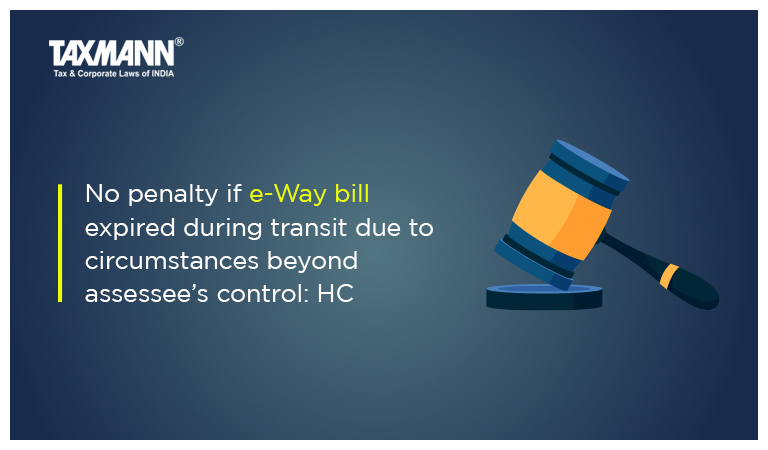No penalty if e-Way bill expired during transit due to circumstances beyond assessee’s control: HC
- Blog|News|GST & Customs|
- < 1 minute
- By Taxmann
- |
- Last Updated on 16 September, 2022

Case Details: Daya Shanker Singh v. State of Madhya Pradesh - [2022] 142 taxmann.com 266 (Madhya Pradesh)
Judiciary and Counsel Details
-
- Sujoy Paul & Prakash Chandra Gupta, JJ.
- Abhishek Kumar Dhayani, Adv. for the Petitioner.
- Darshan Soni, Adv. for the Respondent.
Facts of the Case
In the instant case, the E-way Bill was expired in midnight and the goods of petitioner were detained early next morning on ground of expiry of E-way Bill. It submitted that there was no element of tax evasion and fraudulent intent but the department imposed penalty. It filed writ petition against the penalty order.
High Court Held
The Honorable High Court observed that the E-way Bill of the petitioner was valid up to 19/05/2022 and truck was intercepted on 20/05/2022 at 4.35 A.M. Section 126 of CGST Act, 2017 clearly provides that no penalty should be imposed for ‘minor breaches’ or procedural requirements or omission etc. In this case, mere delay of 4:30 hours appeared to be bona fide. Moreover, the fraudulent intent and negligence on part of petitioner was not established and there was no revenue loss. Therefore, the penalty imposed on petitioner was liable to be set aside.
Disclaimer: The content/information published on the website is only for general information of the user and shall not be construed as legal advice. While the Taxmann has exercised reasonable efforts to ensure the veracity of information/content published, Taxmann shall be under no liability in any manner whatsoever for incorrect information, if any.

Taxmann Publications has a dedicated in-house Research & Editorial Team. This team consists of a team of Chartered Accountants, Company Secretaries, and Lawyers. This team works under the guidance and supervision of editor-in-chief Mr Rakesh Bhargava.
The Research and Editorial Team is responsible for developing reliable and accurate content for the readers. The team follows the six-sigma approach to achieve the benchmark of zero error in its publications and research platforms. The team ensures that the following publication guidelines are thoroughly followed while developing the content:
- The statutory material is obtained only from the authorized and reliable sources
- All the latest developments in the judicial and legislative fields are covered
- Prepare the analytical write-ups on current, controversial, and important issues to help the readers to understand the concept and its implications
- Every content published by Taxmann is complete, accurate and lucid
- All evidence-based statements are supported with proper reference to Section, Circular No., Notification No. or citations
- The golden rules of grammar, style and consistency are thoroughly followed
- Font and size that’s easy to read and remain consistent across all imprint and digital publications are applied



 CA | CS | CMA
CA | CS | CMA
